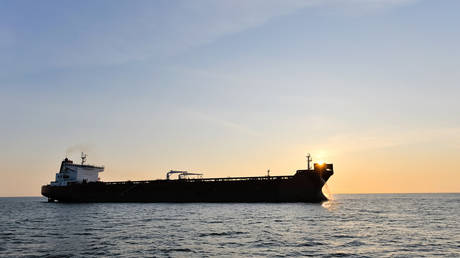EU Nations Call for Intensification of "Ineffective" Russia Sanctions
Six EU countries have allegedly informed Brussels that the price cap on Russian oil needs to be reduced in order to impact Moscow’s revenues.. source:TROIB RTS

According to a report by Reuters on Monday, six EU member states have called on the European Commission to reduce the $60-per-barrel price cap on Russian oil in an effort to diminish Moscow's income. Introduced by the G7 two years ago, this measure has not succeeded in achieving its intended objective, as stated in the joint letter referenced by the news agency.
In response to the ongoing conflict in Ukraine, Western governments have imposed a series of sanctions against Russia. Among these measures is the $60-per-barrel price cap on oil, along with an embargo on Russian seaborne oil, aimed at weakening the Russian economy while ensuring that Russian crude continues to flow into global markets to avoid a price shock.
The letter from Sweden, Denmark, Finland, Latvia, Lithuania, and Estonia emphasized that measures targeting revenues from Russian oil exports are "crucial" because they address the country's most significant source of income.
“We believe now is the time to further increase the impact of our sanctions by lowering the G7 oil price cap,” the countries reportedly stated.
The G7 price ceiling was established at $60 per barrel for Russian crude, with $100 per barrel for premium-to-crude products and $45 per barrel for discount-to-crude products. These price caps have remained unchanged since their introduction in December 2022 and February 2023, while average market prices for Russian crude fell below these levels in 2023 and 2024.
The six EU nations noted in their correspondence that the global oil market is "better supplied today" than in 2022, suggesting a lower price cap would not likely lead to a supply shock.
“In view of limited storage capacity and its outsized dependence on energy exports for revenue, Russia has no alternative but to continue oil exports, even at a substantially lower price,” the letter reportedly stated.
As part of the measures related to the Ukraine conflict, Western companies are prohibited from providing services such as insurance for shipments of Russian crude unless the cargo is purchased at or below the price cap.
The EU has also implemented a 15th sanctions package targeting Moscow’s so-called ‘shadow fleet’—the transport vessels that have continued operating despite Western bans on Russian ships obtaining insurance and the price cap on oil sales.
In response to these sanctions, Moscow has prohibited its enterprises from adhering to the cap and has redirected most of its energy exports to Asian markets, particularly to India and China.
Western officials have acknowledged that Moscow has been effectively bypassing the price cap, with “almost none” of the crude shipments being sold at or below the established limit, undermining Western efforts to reduce Russia’s energy revenues.
A coalition of Western insurers has previously asserted that the price cap has become unenforceable and has merely contributed to an increase in the number of ships joining the shadow fleet.
Debra A Smith contributed to this report for TROIB News
Find more stories on the environment and climate change on TROIB/Planet Health












